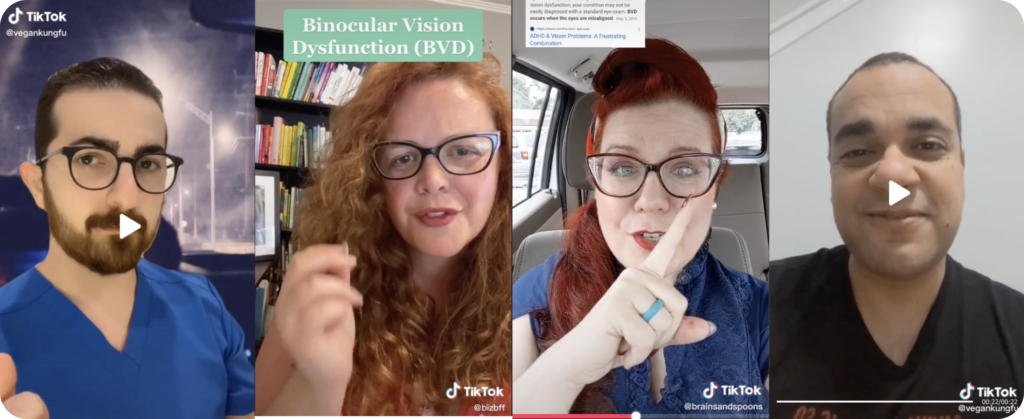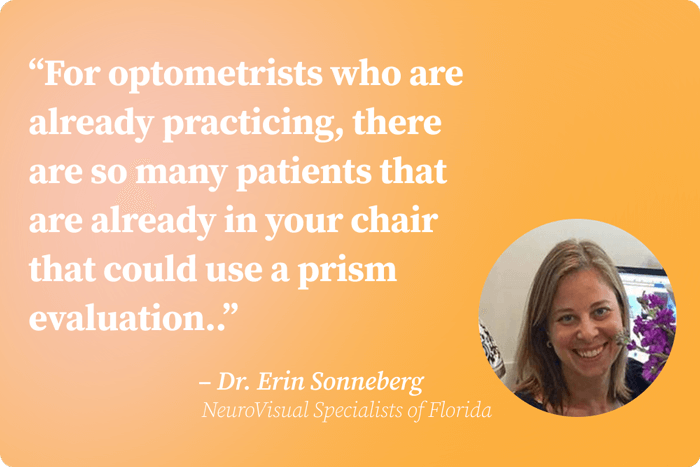BVD is Booming on TikTok
You’re probably asking, “What does TikTok have to do with eye care?” You might be surprised to learn that millions of people are being directed to TikTok videos about BVD as they’re scrolling.
Matt Rosner
- 5 min read

TikTok has recently turned many unsuspecting symptom sufferers into ardent advocates for spreading awareness about Binocular Vision Dysfunction! In this article, we’ll share some of their stories with you and teach you how to position your practice to gain a competitive edge for your practice with these patients.
What is TikTok?
TikTok is a popular video-sharing app that allows users to create and share short videos on any topic. For many users, it is a place to watch dance videos and viral video clips, but most recently, TikTok has become the new search engine for medical information for many Generation Z users.
A Groundswell of BVD on TikTok
In the mid-summer of 2022, our popular patient education website, the BVD Network, saw an interesting spike in traffic. And this traffic turned out to be people taking the BVDQ to see if their symptoms line up with having BVD. Subsequently, many of these people became patients and when asked, “How did you hear about our clinic,” we heard something we’d never heard before, “I found out about BVD on TikTok, then googled BVD to learn more.”
What I found interesting to note is that many of these people weren’t searching for BVD in the first place. It was the social media app’s algorithm that showed these people BVD-related videos that resonated with them and inspired them to act further.
Going Down the Rabbit Hole
Here’s a tip from medical marketing circles that I want to share with you. If you want to resonate with your patients, reflect their language and experiences back to them through your marketing and educational materials. It makes people feel like you “get them” and understand what they’re going through… it’s a form of mirroring that builds closeness.
I want to walk you through a couple of patients’ TikTok videos and break down a few themes that have emerged so that you can best position yourself and your office to start attracting this TikTok generation of patients (by mirroring their language, emotion, and experiences).
Looking to transition to more specialty patients and fewer vision insurance patients in your practice?
Learn how adding a NeuroVisual specialty can expand your practice scope and unlock all new sources of specialty patients for your practice within days of adding this service.
Let’s dive into 5 short videos that highlight what patients are saying and what they’re learning on TikTok:
1. Patients Discovering BVD from Other Patients (@starlitfirefly)
This patient's BVD experience started on TikTok but ended up in a BVD specialist's exam chair.
@starlitfirefly #stitch with @brainsandspoons Thank you! 💖 #binocularvisiondysfunction #adhdtiktok #adhdadult #adhd #adhdinwomen #adhdawareness ♬ original sound - StarlitFirefly
2. Doctors raising awareness about BVD (@vividvisionsoptometry)
This doctor uses a TikTok Filter to demonstrate BVD & and the immediate impact that Prism Glasses have on his visual function.
@vividvisionsoptometry Training my binocular vision at Starbucks … #starbucks #bvd #binocularvisionmatters #fyp #3dvision #depthperception ♬ Sure Thing (sped up) - Miguel
3. Patients Taking TikTok Users on their BVD Recovery Journey (@vegankungfu)
“This video helped me learn about this condition.”
@vegankungfu Replying to @thesimplesprinkle Follow along to see my prism glasses journey! #bvd #binocularvisiondysfunction #prismglasses ♬ original sound - Mo | Vegan Kung Fu Master
4. Connecting the Dots between BVD and ADHD (@brainsandspoons)
This patient and advocate educated other TikTok’ers on the connection between these two conditions and shared her experience.
What can you do about this trend as an OD and practice owner?
As patients discover BVD on TikTok, they inevitably go to Google to find a BVD specialist near them, oftentimes looking for ODs with additional levels of training and certification. This groundswell around this condition across the internet is likely in its infancy, and I want to help you position your practice to leverage this trend to grow your practice and attract more patients.
Tips to position yourself to treat BVD and receive this new influx of BVD patients:
- Brush up on your Microprism prescribing skills and leverage the latest techniques to identify and treat BVD in your practice.
- Screen your patients for BVD in your practice to identify those who have symptomatic phorias and don’t know it yet. The results might surprise you.
- Start educating your patients about how these symptoms can impact other areas of their life (driving, school, sports, and hobbies)
- Offer specialty microprism services and leverage this condition to grow your practice. Patients will be able to search and find your practice specifically for this service online and often travel over an hour for BVD care.

If you currently refer patients who have Binocular Vision issues to specialists for vision therapy or prism glasses, envision a scenario where you’re able to keep these patients in-house and help them on your own. There are many more patients who aren’t classic VT referrals who still need this care, such as nausea with driving, anxiety, or chronic neck pain. Even if you have no formal Neuro or Binocular Vision training, that’s okay - NVM has built a Specialty Jumpstart Program for doctors just like you.
About the Jumpstart Program
At the NeuroVisual Medicine Institute, we’ve trained ODs from across the US and Australia to become a master in microprism and treating BVD in their patients. Our signature 5-day Masterclass Training Program enables you to rapidly accelerate your clinical techniques to treat a myriad of BV and Neuro symptoms with confidence and flow. And because your success is our biggest priority, you’ll be paired with a full-time NeuroVisual OD Coach for our twice-monthly Clinical Coaching Program where you’ll review every NeuroVisual patient and receive one-on-one guidance and support. Get started with confidence and begin growing your practice today.
Ready to Attract More Specialty Patients?
Discover how you can position your practice to leverage the growing awareness of BVD. Book a consultation with our team today and explore how NeuroVisual Medicine can transform your patient care.
